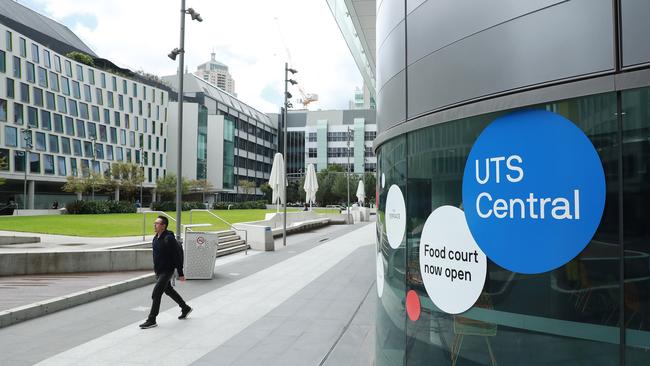The coronavirus has forced universities to step up their online education capacity
The coronavirus is forcing universities to put nearly all their courses online and that could change education forever.

The coronavirus pandemic has forced universities to rush to put courses online in what a former vice-chancellor said could be a watershed moment for higher education.
Since the ban on non-essential gatherings of more than 500 people was announced universities have fast-tracked their online plans.
By Tuesday five universities — Queensland, La Trobe, Swinburne, UTS and Wollongong — had announced suspensions in teaching ranging from four days to two weeks, to give them time to put learning material online before classes recommence.
Former University of Canberra vice-chancellor Stephen Parker said the forced shift to online teaching, although occurring in the midst of a crisis, might one day be viewed as a “watershed moment” that improved education.
“It could be the death of the dull lecture,” said Dr Parker, now education sector leader for KPMG Australia.
Since Sunday, many other universities are continuing teaching but said they would move many classes online as fast as possible.
The University of Melbourne has ceased all large lectures with more than 500 students and, by next Monday, aims to have all classes larger than 25 students delivered by “alternative” methods.
Curtin University said it would have all lectures available online by March 20.
Western Sydney University said it was progressively moving classes, lectures and tutorials online over the next few weeks.
Many universities have also cancelled all non-essential meetings and other gatherings, including graduations, events run by student clubs, sports training, and sporting matches and events.
Dr Parker said that while “the immediate interests of students have to be paramount”, the crisis was an opportunity for change.
“We can’t give the long term priority over the short term,” he said. “But it would be a shame if, after the crisis is over, we slip back into the old operating routines when there are opportunities for more effective education for students.”
Jack Goodman, founder and executive chair of education technology firm Studiosity, said that once the crisis was over, having the ability to deliver all courses digitally should be considered part of sound risk management at a university.

“Every university needs to have the capacity to deliver digitally all of the essential elements of a face-to-face student experience,” said Mr Goodman, whose company provides online study support for students at most Australian universities.
A survey carried out by education market intelligence firm HolonIQ (with over 700 respondents) found that 91 per cent of education institutions globally believe they will suffer short-term damage from the coronavirus and, in the long term, half believe they will still be worse off.
However, among edtech firms, only half see themselves as worse off in the short term and, in the long term only about one-fifth believe they will be worse off and well over half (58 per cent) think they will be better off.
Maria Spies, HolonIQ co-founder and managing director, said it was “the opportunity for online learning to show it can be just as good as face-to-face”.
But she warned that crisis mode development of courses could lead to problems. “If people are rushing to get it online the experience won’t be great,” she said.

Beau Leese, co-founder and CEO of Practera, another edtech firm, said the coronavirus crisis was accelerating the already existing trend toward digitally delivered education.
But he said digital education was currently far less advanced than digital platforms in the finance and health industries.
Mr Leese said Practera’s platform, which supports educators, employers and students in experiential and work-integrated learning, was successfully operating during the coronavirus crisis.
He said hundreds of University of Sydney students in China were using the platform to develop soft skills, such as decision-making and communications, with feedback from Australian mentors.




To join the conversation, please log in. Don't have an account? Register
Join the conversation, you are commenting as Logout